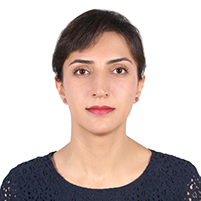Position: Postdoctoral Researcher
Current Institution: Harvard University
Abstract: Miniaturized Robotic Swarms for Sensing, Surveying, and Inspection
Over the past two decades the field of swarm robotics has been very successful at developing ground aerial and aquatic robotic swarms that demonstrate a variety of collective behaviors. A main challenge that remains unmet however is deployment of robot swarms to deliver applications in uncontrolled real-world settings. Sensing surveying and inspection applications will largely benefit from deployment of robot swarms. Swarms of miniaturized robots will enable accessing environments that are beyond the reach of typical platforms. My research aims to develop: (i) large-scale swarms of miniaturized robotic modules for sensing surveying and inspection applications addressing challenges in their power sensing communication actuation and locomotion means and (ii) control algorithms for coordinating the swarm along with comprehensive modeling frameworks at multiple abstraction levels that accurately capture the physics of the individual robots and their interactions with the environment (i.e. low-abstraction models) as well as the behavior and the performance of the robot swarm (i.e. high-abstraction models). In turn such models will aid hardware design and development (using low-abstraction physics-based models) and enable data driven approaches for designing control algorithms (using high-abstraction mathematical models).
Bio:
Bahar Haghighat is currently a post-doctoral researcher at Harvard. She obtained her PhD in Robotics Control and Intelligent Systems in 2018 from the Swiss Federal Institute of Technology (EPFL). Her PhD research focuses on mechatronic design and development of an aquatic swarm of miniaturized resource-constrained robotic modules performing self-assembly. Her work has been highlighted by several publications in venues such as IEEE ICRA and IROS conferences (2015 2016 2017 2018 and 2020) Robotics and Autonomous Systems journal (2019) and Swarm Intelligence journal (2017). She is the recipient of EPFL’s PhD research award of Gilbert Hausmann for the best PhD thesis in the fields of mechanical engineering electricity and physics (2019) EPFL distinction of excellence for a PhD thesis in Robotics Control and Intelligent Systems (2018) two Swiss National Science foundation (SNSF) post-doctoral fellowship awards (2017 and 2019) and the third place in EPFL’s My Thesis in 180 Seconds competition (2017).
